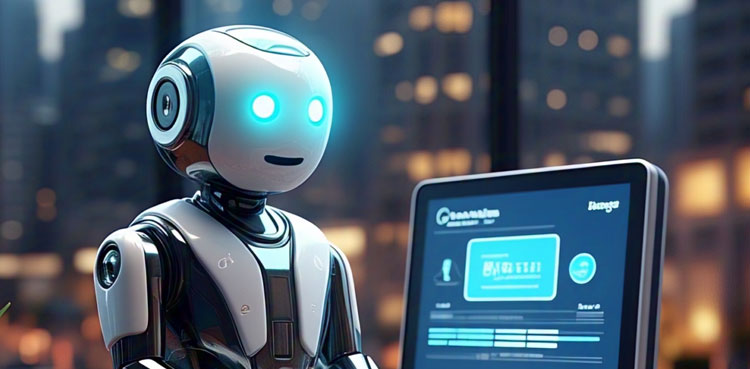
The AI Revolution: Transforming the Future of Human Life

The Artificial Intelligence (AI) revolution is no longer a distant sci-fi fantasy; it is a present-day reality reshaping the fabric of society. From healthcare and education to transportation and entertainment, AI is permeating every aspect of human life. As we stand on the brink of what many call the “Fourth Industrial Revolution,” the transformative potential of AI is both exhilarating and daunting. This article explores the profound implications of the AI revolution, examining how it could redefine our future, the opportunities it presents, and the challenges it poses.
The Evolution of AI: From Concept to Reality
AI, broadly defined as the simulation of human intelligence by machines, has evolved significantly since its inception in the mid-20th century. Early AI systems were rule-based and limited in scope, but advancements in machine learning, neural networks, and computational power have propelled AI into a new era. Today, AI systems can perform complex tasks such as natural language processing, image recognition, and decision-making with remarkable accuracy.
The advent of deep learning, a subset of machine learning, has been particularly transformative. By mimicking the structure and function of the human brain, deep learning algorithms can analyze vast amounts of data, identify patterns, and make predictions with minimal human intervention. This capability has enabled breakthroughs in fields like autonomous driving, medical diagnosis, and personalized recommendations.
The Impact of AI on Everyday Life
- Healthcare: Precision Medicine and Beyond
AI is revolutionizing healthcare by enabling precision medicine, where treatments are tailored to individual patients based on their genetic makeup, lifestyle, and environment. Machine learning algorithms can analyze medical data to predict disease outbreaks, diagnose conditions, and recommend personalized treatment plans. For instance, AI-powered imaging systems can detect cancers at early stages with higher accuracy than human radiologists.
Moreover, AI-driven robotics are assisting in surgeries, reducing the risk of human error and improving patient outcomes. Virtual health assistants powered by AI are providing 24/7 support to patients, answering queries, and reminding them to take medications. These advancements promise to make healthcare more accessible, efficient, and effective.
- Education: Personalized Learning
In the realm of education, AI Revolution is paving the way for personalized learning experiences. Intelligent tutoring systems can adapt to the learning pace and style of individual students, providing customized feedback and resources. AI-powered platforms can identify areas where students struggle and offer targeted interventions, thereby enhancing learning outcomes.
Furthermore, AI is breaking down language barriers through real-time translation tools, making education more inclusive. Virtual reality (VR) and augmented reality (AR) technologies, powered by AI, are creating immersive learning environments that engage students in ways traditional methods cannot.
- Transportation: The Rise of Autonomous Vehicles
The transportation sector is undergoing a seismic shift with the development of autonomous vehicles. AI algorithms, combined with sensors and cameras, enable self-driving cars to navigate complex environments, avoid obstacles, and make split-second decisions. The widespread adoption of autonomous vehicles could reduce traffic accidents, lower emissions, and transform urban planning.
In addition, AI is optimizing public transportation systems by predicting demand, optimizing routes, and reducing wait times. The integration of AI in logistics is streamlining supply chains, reducing costs, and improving delivery efficiency.
- Work and Employment: The Double-Edged Sword
The impact of AI on employment is a topic of intense debate. On one hand, AI is automating routine and repetitive tasks, leading to increased productivity and the creation of new job categories. On the other hand, there is concern that AI could displace workers in certain sectors, leading to job losses and economic inequality.
To mitigate these challenges, there is a growing emphasis on reskilling and upskilling the workforce. Governments, educational institutions, and businesses must collaborate to equip individuals with the skills needed to thrive in an AI-driven economy. Moreover, the rise of AI could lead to the emergence of new industries and opportunities that we cannot yet foresee.
- Ethics and Governance: Navigating the Challenges
As AI becomes more integrated into our lives, ethical considerations and governance frameworks are paramount. Issues such as data privacy, algorithmic bias, and the potential for AI to be used in malicious ways must be addressed. Ensuring transparency, accountability, and fairness in AI systems is crucial to building public trust.
Regulatory bodies and policymakers play a critical role in establishing guidelines and standards for the development and deployment of AI technologies. International cooperation is essential to address the global implications of AI and to prevent a fragmented regulatory landscape.
The Future of AI: Opportunities and Challenges
The future of AI holds immense promise, but it also presents significant challenges. As AI systems become more advanced, the potential for them to outperform humans in various tasks increases. This raises questions about the role of humans in an AI-dominated world and the potential for AI to surpass human intelligence—a concept known as artificial general intelligence (AGI).
While AGI remains a theoretical possibility, its realization could have profound implications for humanity. The development of AGI could lead to unprecedented advancements in science, medicine, and technology, but it also poses existential risks if not managed carefully.
Conclusion
The AI revolution is transforming the way we live, work, and interact with the world. Its potential to improve healthcare, education, transportation, and countless other domains is immense. However, the challenges it presents—ranging from ethical concerns to the impact on employment—cannot be ignored.
As we navigate this transformative era, it is imperative to strike a balance between harnessing the benefits of AI and addressing its risks. By fostering collaboration among governments, businesses, and civil society, we can ensure that the AI revolution leads to a future that is not only technologically advanced but also equitable and sustainable. The choices we make today will shape the trajectory of AI and its impact on humanity for generations to come.
from Science and Technology News - Latest science and technology news https://ift.tt/n6hOULi



0 Response to "The AI Revolution: Transforming the Future of Human Life"
Post a Comment